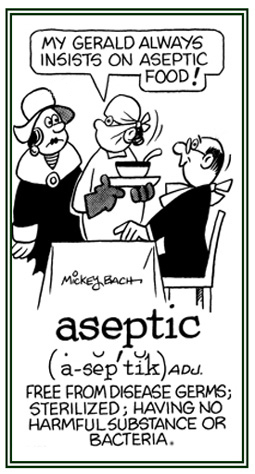a-, an-
(Greek: prefix; no, absence of, without, lack of; not)
These prefixes are normally used with elements of Greek origin, a- is used before consonants and an- is used before vowels.
It affects the meanings of hundreds of words.
There are too many words that use these prefix elements to list all of them on this site; however, there are significant examples listed in this and the other units where they exist.
2. Botany, having no winglike parts or extensions: When Joe planned his garden, he included many apterous plants which would not disseminate their seeds with winglike structures.
Since Martin is afflicted with aptyalism, he has a very dry mouth and has a problem eating without frequent sips of water.
Rapid arrhythmias (greater than 100 beats per minute) are called "tachycardias" while slow arrhythmias (slower than 60 beats per minute) are called "bradycardias"; and sometimes, irregular heart rhythms are called fibrillations or muscular twitching in the heart that involves individual muscle fibers that move without coordination.
2. The inability to use or to understand signs, gestures, or written or printed language: This disorder of the loss of the ability to make or to understand any of the normal methods of communication is known as asemia which could be caused by a damaged part of the brain or a mental or an emotional problem rather than a physiological ailment.
2. Free from microorganisms that produce disease, fermentation, or putrefaction: A minimal procedure to ensure one's hands are asepsis is to not only carefully wash them with soap and water, but also to use special alcoholic antiseptics.
Asepsis is a term that is used to distinguish it from "antisepsis" and it applies to the principle in surgery of not applying strong germicides like corrosive sublimate or carbolic acid to wounds.
All of the dressings, swabs, and instruments used in the surgery process are sterilized by steaming, boiling, or dry heat in order to support asepsis.
Asepsis is maintained by using thin, sterilized plastic, or rubber, gloves and gowns with disposable masks which are worn by surgeons to prevent the risk of infection from their hands and wearing apparel.
Surgery that continually utilizes asepsis has the advantage of allowing the germ-destroying activity of the body tissues and their healing powers to increase by not letting antiseptics decrease the vitality of the tissues.
2. The absence of harmful microorganisms: Hospitals are expected to make every effort to keep operating rooms aseptic so patients won’t be contaminated with infectious germs during an operation.

Go to this Word A Day Revisited Index
so you can see more of Mickey Bach's cartoons.
2. Designed to prevent infection from pathogenic microorganisms: Ted, the health practitioner, taught the homeless people some basic lessons in asepticism in order to help them maintain better health.
3. Free of pathogenic microbes: An asepticism of surgical instruments and environment is always a major objective of hospitals.
4. Using methods to protect against infection by pathogenic microorganisms: Dr. Payne insists on preparing a condition of asepticism for patients before any surgical procedures take place.
5. Lacking animation or emotion: Jim's facial asepticism was difficult to maintain all the time while the seals were performing at the aquarium.
2. A system of packaging sterilized products in airtight containers so that freshness is preserved for several months: The packaging industry was always looking for ways to increase aseptics in their productions.
2. Having no sex; that is, genderless (being neither male nor female): Many organisms, including plants, fungi, parasites, etc., have asexual forms of reproduction.


